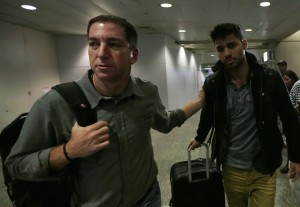Journalists, Terror laws, and The Guardian
Posted by Prof. Richard Sambrook
 This week’s detention of a journalist’s partner at Heathrow has ignited an August row. Glenn Greenwald is the journalist responsible for reporting Edward Snowden’s leak of NSA and GCHQ surveillance activities for The Guardian. When his partner was held for 9 hours and had all his computer equipment confiscated by “agents” during a change of plane at Heathrow it produced predictable responses. Some cried foul – families should be off limits. Others shrugged and said “what do you expect?”. In the midst of this was a debate about free press and the role of the state.
This week’s detention of a journalist’s partner at Heathrow has ignited an August row. Glenn Greenwald is the journalist responsible for reporting Edward Snowden’s leak of NSA and GCHQ surveillance activities for The Guardian. When his partner was held for 9 hours and had all his computer equipment confiscated by “agents” during a change of plane at Heathrow it produced predictable responses. Some cried foul – families should be off limits. Others shrugged and said “what do you expect?”. In the midst of this was a debate about free press and the role of the state.
The story was complicated when the New York Times revealed that the partner, David Miranda, was carrying information between Greenwald and another contact of Snowden’s – and his flights were paid by The Guardian.
My view takes more than Twitter’s 140 characters.
- If you reveal a country’s national secrets you shouldn’t be surprised if their security services take an aggressive interest in you. Which doesn’t mean you were wrong to report them.
- Family members and loved ones should not have to carry public responsibility for your professional actions. But when they act as couriers for your work, they are more than family members and loved ones – they are your proxy.
- Claiming “free speech” interests, and saying your opponents will be “sorry”, does not encourage public support. The public don’t care about journalists.
- Having said all of that, governments, police and intelligence services need to recognise that journalism, even when it is inconvenient, embarrassing or blows secrets, is a legitimate – indeed essential – activity.
- Journalism is not terrorism so terrorism laws should not be used to intimidate journalists.
- There is no question governments embarrassed by the latest rounds of whistleblowing would like to cast a chill across investigative journalism. There’s also no doubt it is not in the interests of a free society to allow that to happen.
- At heart the issue is the legitimate scope and role of intelligence and security operations in a modern liberal democracy. As a first stab, they should be as minimal as necessary – recognising that there are serious threats to western states so their activities are bound to be, and need to be, of significant scale.
- What matters is how their powers are used and their accountability. It’s what a country’s moral authority rests upon. That’s what’s at issue here.
The terrorism law in question is Schedule 7 of the Terrorism Act. The Home Secretary had already taken the view its powers were too wide and scheduled changes.
Many feel there is insufficient scrutiny and accountability of the UK’s security agencies for the public to trust them. Even David Anderson QC, the government’s independent reviewer of terrorism legislation, is calling for a wide public and parliamentary debate on this law. What may have started as a clumsy piece of intimidation could have far wider consequences.

Reposting this on Calderdale NUJ Facebook page, hope this is ok? https://www.facebook.com/CalderdaleNUJ
As to point 3, it has been clarified that Glenn Greenwald did not say that the government would be “sorry” for what they had done: http://www.washingtonpost.com/blogs/the-switch/wp/2013/08/19/no-glenn-greenwald-didnt-vow-vengeance-he-said-he-was-going-to-do-his-job/
Thanks Kirsten – yes, this was clarified after I posted, although he did say he thought the UK would come to “regret” their action in his piece in The Guardian I think.
And what is your opinion of Guardian editor Alan Rusbridger’s admission that he was intimidated by two GCHQ security men into smashing two computer hard drives in the basement of Guardian Towers? An act that has attracted criticism from at least some of the paper’s journalists.
I’m not sure he had much choice although, as he said, it illustrated the authorities complete lack of understanding about how global digital journalism works to think this would make any difference.